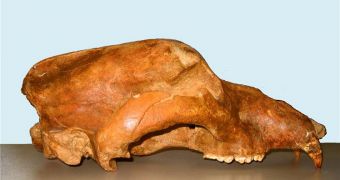Human expansion may have played a very important role in the decline and eventual extinction of cave bears, a new scientific study shows. Previously, it was believed that climate change was to blame.
For many years, researchers believed that climate change forced cave bears to go extinct throughout Europe, some 24,000 years ago.
But new data seem to indicate that the mammals in fact began declining some 50,000 years ago, and that human expansion and aggression was one of the predominant factors that led to their demise.
Researchers behind the investigation looked at mitochondrial DNA data collected from 17 cave bear fossils, and then cross-referenced the results with samples of the same type, collected from modern-day brown bears.
“The decline in the genetic diversity of the cave bear (Ursus spelaeus) began around 50,000 years ago, much earlier than previously suggested, at a time when no major climate change was taking place, but which does coincide with the start of human expansion,” tells SINC Aurora Grandal-D'Anglade.
The expert is a researcher at the University of Coruna (UC) University Institute of Geology, in Spain.
She is also the coauthor of a new paper detailing the findings, which appears in the latest issue of the esteemed scientific journal Molecular Biology & Evolution, AlphaGalileo reports.
According to the earliest fossil evidence, early humans began arriving in Europe some 35,000 to 30,000 years ago, which coincides with the time when cave bears stopped being abundant in the central parts of the continent.
This decline “can be attributed to increasing human expansion and the resulting competition between humans and bears for land and shelter,” says Grandal-D'Anglade.
At the time, occupying a cave meant the difference between life or death at night, and both bears and humans were aware of that. In the long run, our bigger brains helped us win the battle.
When it comes to modern-day brown bears, researchers say that the animals were able to endure simply because they were not so heavily dependent on caves for their very survival.
This allowed them to find shelter at other locations as well, places where a polar bear wouldn't have ventured.
“Brown bears rely on less specific shelters for hibernation. In fact, their fossil remains are not very numerous in cave deposits,” says the researcher.
The recent work was carried out by a team of German investigators from the Max Planck Institute for Evolutionary Anthropology.

 14 DAY TRIAL //
14 DAY TRIAL //